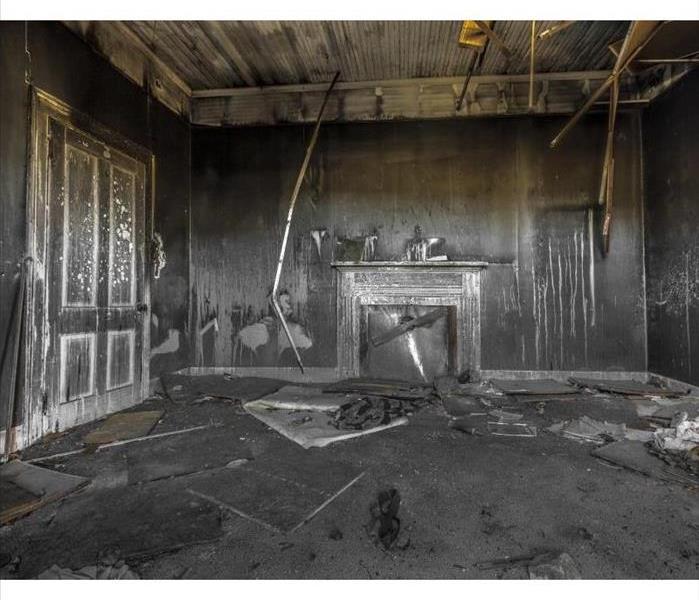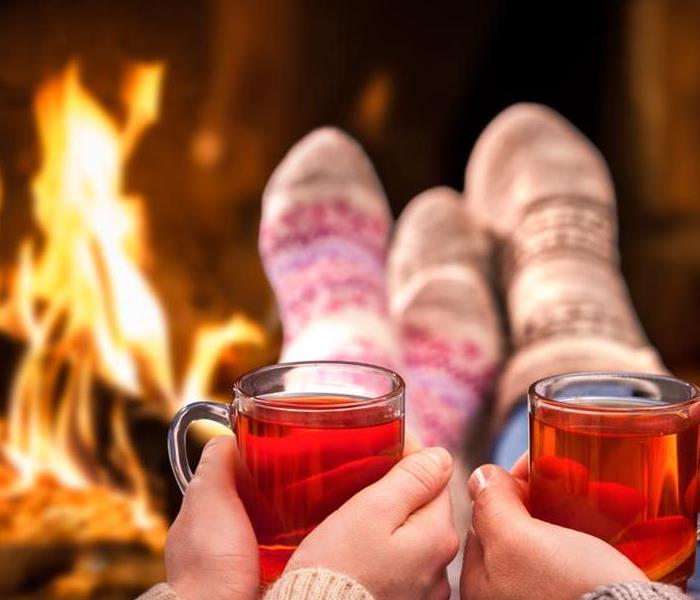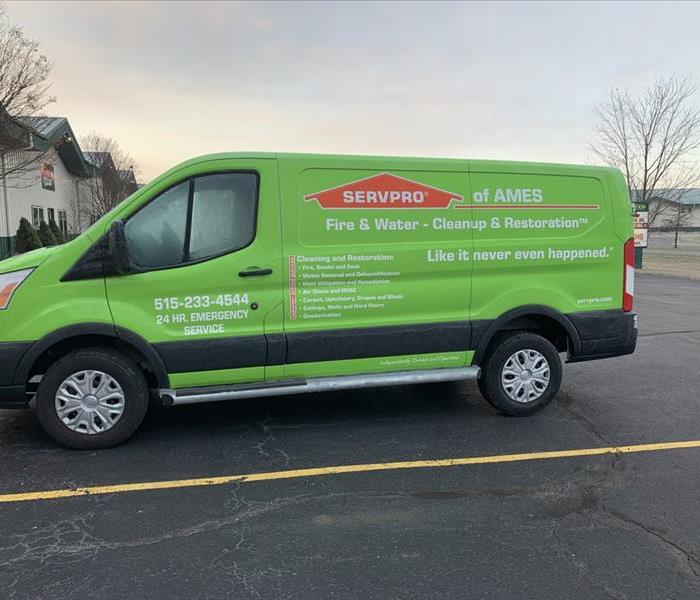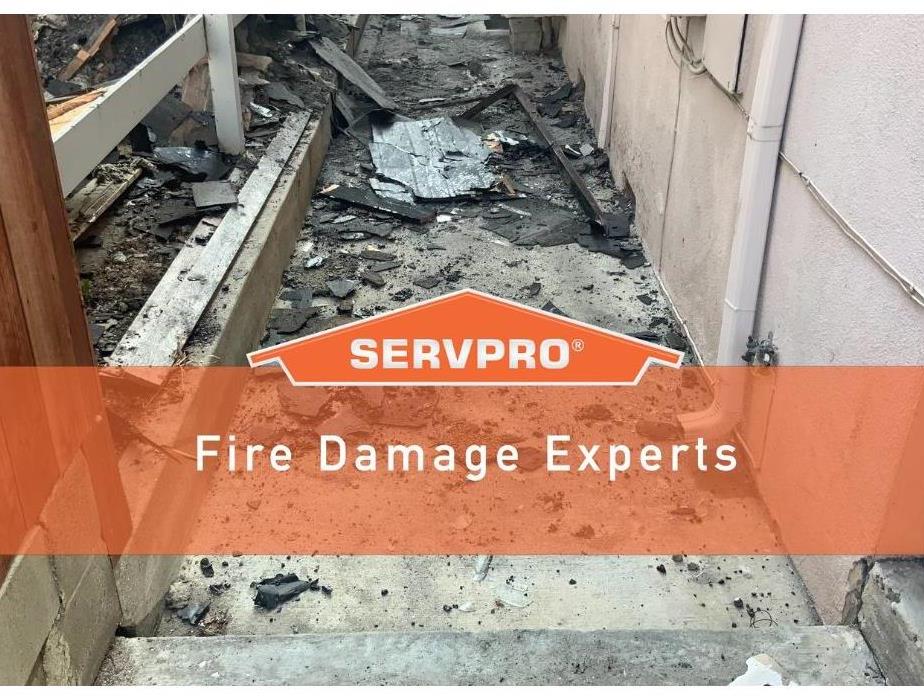Archived Fire Damage Blog Posts
Keep SERVPRO of Marshalltown on Emergency Fire Contact List
8/28/2024 (Permalink)
As temperatures drop and fireplaces and furnaces kick in, so do the risks of house fires. According to the Red Cross, Winter is the most common time for home fires.
Though it’s not enjoyable to plan for a house fire, it is important to think ahead. Not only should you create a fire escape plan to share with your family, but you should also decide in advance what restoration company to use so you can be ready if the time comes.
Choose SERVPRO of Marshalltown for Fire Restoration
The staff of SERVPRO of Marshalltown has many years of combined experience and certified training to help restore your home and all your salvageable contents to their pre-fire condition. We do this by following three methods of deep cleaning.
Structural Cleaning
After a fire, the structural elements of your home will likely need to be cleaned, including carpets, walls, and subfloors. Our trained technicians will first perform a test to establish the extent of the damage. This helps us choose the best equipment and cleaning techniques to handle your surfaces. In some cases, we can remove mild soot buildup straight from the walls, while in other cases, we may have to completely repaint after cleaning and prepping your walls.
Content Cleaning
Your personal belongings are just as important as your home itself—that’s why we make sure we carefully and properly clean all the contents inside your house, too. Curtains, rugs, and furniture can be cleaned and deodorized using either wet or dry cleaning processes. We can often also restore other damaged items such as clothing, books, and more.
Deodorization Services
Fire can leave behind persistent smoke odors, but it can also leave behind hazardous soot particles that may lead to health issues. Instead of using artificial fragrances to mask the odors, we go to the source of the odors and remove them with air scrubbers and other odor-eliminating equipment. With a variety of deodorization methods available, we work with you to choose what’s best for your situation.
Trust SERVPRO of Marshalltown after a fire to help restore your home in Dike, Alden, Melbourne, Traer, or anywhere in Marshall, Hardin, Grundy, or Tama County. Keep us on your list of emergency contacts at 641-758-9746. You can call us any time, day or night!
How to Help Prevent Furnace Fires
6/27/2023 (Permalink)
This summer, we were all thinking about how to stay cool. But with autumn upon us, it’s time to start cranking up the heat again (hopefully not too soon). If you heat your house with a furnace, a little preventive maintenance now can help prevent a fire when you do turn on your heat.
Gas furnaces are more prevalent than wood or coal. (Yes, about 130,000 households still burn coal.)
And while furnaces are generally quite safe, they can occasionally cause house fires. That’s why it’s important to properly maintain any kind of furnace.
Clean around the furnace. Move any debris or stored items at least three feet away from your furnace.
Clean the furnace itself. Dirt and grime can cause overheating. They can also prevent you from seeing any damage or other problems.
Replace dirty air filters. Dirty or clogged air filters prevent the flow of air, leading to overheating. This can increase the likelihood of a fire.
Check your chimneys and vents. Clogged vents or flues can lead to fires. Call a professional if you need help with this task.
Check smoke and carbon monoxide alarms. Both should be installed throughout your house and should be tested to see if they’re working properly. If you don’t have both kinds of alarms, make that the first thing on your list.
Invest in a professional maintenance checkup. A furnace professional can identify and correct problems such as a cracked heat exchanger or incorrect pressure in the furnace. Even flame color can tell an experienced repair person how well your furnace is functioning. If you haven’t had your furnace serviced lately, make an appointment this month.
If your home has suffered fire damage, SERVPRO of Marshalltown can help. Our agents are on call around the clock so we can start helping you get back to normal, fast. Contact us at any hour for assistance.
Follow These Safety Habits to Prevent A Dangerous Grill Fire
6/27/2023 (Permalink)
Grill season lasts well into the fall, and most of us are likely making good use of our grills to cook our favorite warm-weather foods. Grilling allows you to get outside and enjoy the extra daylight summer has to offer, but they also cause many deaths and injuries as well as millions of dollars in property damage each year. No matter how frequently you use your grill, you should always practice good safety habits to avoid a fire.
Create a safe zone around your grill. While setting your grill up on your deck may be convenient, it’s not a good choice for its location. Grill fires can flare up and easily spread to surrounding property, including porches, patio railings, and decks. Grill fires can also melt vinyl siding. It’s recommended that you keep at least a three-foot safe zone around your grill at all times away from your home’s structure.
Clean your grill grates often. Food particles and fat can build up on the grill over time, creating a prime opportunity for a grease fire to break out on your grates. Giving the grill a quick brush after each use helps keep down flammable buildup.
Never leave the grill unattended. Just as you would not leave your stove top unattended, you should never walk away from a lit grill, even if the lid is down. Fires can start in an instant. As a rule, you should keep your eye on the grill at all times and keep a fire extinguisher nearby so you can immediately stop a fire from spreading if it occurs.
Inspect the grill regularly. While charcoal grills pose fewer hazards, you need to be extremely vigilant about frequently checking the gas lines of a propane grill. The seals around the propane tank and the lines that transport the gas can become worn with time and allow gas leaks that can potentially lead to dangerous explosions. If you see any signs of wear on the tank or the lines, carefully and safely replace them.
If a grill fire damages your home in Alden, Traer, Dysart, Melbourne, or anywhere in Marshall, Hardin, Grundy, or Tama County, call SERVPRO of Marshalltown at (641) 758-9746 any time, day or night. We’ll be there quickly to protect your property from further damage and restore it to its original state, “Like it never even happened.”
Tips for Developing a Fire Drill Procedure for Your Business
5/9/2022 (Permalink)
Many businesses experience devastating fires every year. If you’re a business owner in Marshalltown, Iowa Falls, Grundy Center, Wellsburg, Reinbeck or any other town in our service area and you have employees on the premises, we want to help you prepare them for the possibility of a fire and keep them safe. Here’s how you can begin to create a fire evacuation drill procedure for your business:
Consult with your local fire officials.
Getting in touch with your local fire department is often a great place to start on any aspect of fire preparedness for your business. They will typically be happy to consult with you on fire safety measures your business can take, including the best evacuation routes and fire procedures to go over with your staff.
Communicate and mark fire evacuation routes.
Once you have your evacuation routes set, mark them clearly with signs and communicate with staff on what this means. Involving your employees in the fire safety process will make everyone feel safer and prepare them for when you start scheduling regular drills.
Schedule fire drills frequently.
Your staff needs to be so familiar with evacuation procedures that they have no questions about what to do should a fire break out. The best way to prepare them is to hold regular fire drills, at least once every quarter. These should be mandatory drills that require everyone to leave the premises according to the established escape route, gather at a predesignated area and be accounted for by a supervisor once everyone is evacuated. They should also be trained not to leave the designated area until given the all-clear sign to return to the building.
Run different fire scenarios. Fires can start due to a myriad of reasons, so it is important to prepare for all possibilities when you hold your fire drills. Practice for different situations by blocking off different exits and having the fire drill originate in different parts of the building to give everyone the tools they need to escape safely regardless of what type of fire is started.
If your business has experienced fire damage, call SERVPRO of Marshalltown anytime, day or night. We are a local business that specializes in commercial fire restoration and are ready to be there quickly when you need us. Call (641) 758-9746.
How Do You Prevent Fires In The Basement?
5/5/2022 (Permalink)
To be able to prevent a basement fire, you first need to identify what can cause a fire. Below is a list of the 15 most common fire hazards found in the basement, and what you can do to prevent a fire from happening.
- Smoke Detector– A properly working smoke detector is your first line of defense in notifying you of a fire. It is the law to have a working smoke alarm on every story of the home, and outside of all sleeping quarters.
Prevention – Every month you should get in the habit of testing each smoke detector in your home to ensure that they are working properly and that the batteries are changed at least once every year or sooner if required. Smoke detectors should get replaced every ten years.
- Extension Cords– Extension cords can quickly overheat and cause a fire if they are used to power appliances that consume more watts than what the extension cord was rated to handle. A frayed or damaged cord could also start a fire.
Prevention – Do not use an extension cord for more than one appliance and never permanently. Always double check that the extension cord that you are using has a higher amperage rating than the appliance or product that you are powering. Replace damaged cords and make sure not to overuse or damage the prongs. Never remove the grounding plug from any electrical components so that you can use a two-prong extension cord to power it.
- Gas Water Heater– If a gas water heater is leaking natural gas, it can lead to not only fire but an actual explosion. One other thing to watch out for with a gas water heater is to make sure that nothing gets too close to the burner at the bottom of the tank that could catch fire.
Prevention – Have a licensed gas fitter properly maintain your water heater and make sure to have regular tune-ups on the tank. Frequently check the pressure valve to ensure proper heating and pressure of the tank are within normal limits. Never toss clothing, papers, cardboard, rags, or anything else flammable next to the water heater.
- Gas Fireplace– If a gas fireplace is leaking natural gas, this could cause a fire or an explosion. The surface of a gas fireplace can get very hot, and some items if left too close could ignite into flames.
Prevention – Make sure that your gas fireplace is installed by a professional. You can get oxygen-depletion sensors installed that will ensure that there is not a build-up of carbon monoxide in the air because if there were that would trigger the sensors and shut off the gas. Also if you are hanging clothes or other items near the gas fireplace, make sure to keep them at least three feet away.
- Wood Stoves– Wood burning stoves can cause a build-up of creosote within the chimney, which can lead to chimney fires. This combustible residue is a chemical mass of carbon that comes from burning wood, fossil fuels or tar, and can be commonly found inside of a fireplace or sticking to the sides of a masonry chimney.
Prevention – Make sure to inspect and clean your chimney at least once every year. Keep the chimney flues open a few times during the day while the fire is on to provide inlet air to help avoid a lot of build-up of creosote. Only burn dry, clean wood, and make sure never to overload the stove. Keep the stove doors closed unless you are loading more wood or cleaning old ashes.
for more in visit basementissues.com
Fire Damage Restoration Process
2/22/2022 (Permalink)
 Faster to Any Size Disaster
Faster to Any Size Disaster
After the fire trucks leave, your home likely suffers from fire and smoke damage and extensive water damage from firefighting efforts. SERVPRO of Marshalltown has the specialized fire restoration training needed to restore your home to pre-fire condition.
Every fire damage event is a little different, and requires a unique solution, but the general process stays the same. The steps listed below illustrate our process for the “typical” fire damage emergency.
Step 1: Emergency Contact
The restoration process begins when you give us a call. Our specialist will ask a series of questions regarding the fire damage event that will help us arrive quickly with the appropriate equipment and resources.
Step 2: Inspection and Fire Damage Assessment
We will carefully inspect and test adjoining rooms of your property to determine the extent of the fire, smoke, and soot damage. This step is crucial to developing a plan of action.
Step 3: Immediate Board-Up and Roof-Tarp Service
Fire damage can often compromise windows, walls, and roofs. To maintain security and to protect against further damage, SERVPRO of Marshalltown can board up missing windows and walls and place tarps on damaged roofs.
Step 4: Water Removal and Drying (if water damage is present)
The water removal process begins almost immediately and removes the majority of the water. We will then use dehumidifiers and air movers to remove the remaining water and complete the drying process.
Step 5: Removal of Smoke and Soot from All Surfaces
SERVPRO of Marshalltown uses specialized equipment and techniques to remove smoke and soot from ceilings, walls, and other surfaces.
Step 6: Cleaning and Sanitizing
We will clean all of the restorable items and structures that were damaged by the fire. We use a variety of cleaning techniques to restore your belongings to pre-fire condition. We’re also trained to remove odors using industrial air scrubbers and fogging equipment.
Step 7: Restoration
Restoration is the final step—getting your home or business to its pre-fire condition. Restoration may involve minor repairs, such as replacing drywall, painting, and installing new carpet; or it may entail major repairs such as the reconstruction of various areas or rooms in a home or business.
Winter Fire Safety
1/25/2022 (Permalink)
 Cozy up this winter stress-free knowing how to best prepare for the cold!
Cozy up this winter stress-free knowing how to best prepare for the cold!
1/21/2022
With Winter firmly establishing itself throughout Iowa over the last few weeks, plenty of us are considering ways to stay as warm as possible until the Spring. Heat is such a critical part of a Midwesterners Winter, which makes winter fire safety is all too important. We continue our Winter Preparedness Series today by diving into the topic of winter fire safety, mainly discussing how it applies to residential properties. While there are many reasons for house fires occurring, the rate and probability of housefires increases throughout times of cold weather and frigid temperatures. Common Winter themes such as candles burning, warm food cooking, and heaters set on high can all lead to a potential winter fire risk.
Carbon Monoxide Safety Tips
- Have your home heating systems (including chimneys and vents) inspected and serviced annually by a trained service technician.
- Never use portable generators inside homes or garages, even if doors and windows are open. Use generators outside only, far away from the home.
- Never bring a charcoal grill into the house for heating or cooking. Do not barbeque in the garage.
- Never use a gas range or oven for heating.
- Open the fireplace damper before lighting a fire and keep it open until the ashes are cool. An open damper may help prevent build-up of poisonous gases inside the home.
- Install battery-operated CO alarms or CO alarms with battery backup in your home outside separate sleeping areas.
- Know the symptoms of carbon monoxide poisoning: headache, dizziness, weakness, nausea, vomiting, sleepiness, and confusion. If you suspect CO poisoning, get outside to fresh air immediately, and then call 911.
- Check smoke alarms once every 30 days and replace every 10 years.
Prevent Home Fires
- Portable Space Heaters - Keep combustible objects at least 3 feet away.
- Fireplaces & Woodstoves - Inspect and clean pipes and chimneys annually.
- Generators - Use in well ventilated locations outside at least 5 feet from all doors, windows, and vent openings.
- Cooking - stay in the kitchen and turn off the stove if you leave, even for a short period of time.
- Electrical & Appliance Safety - Replace all worn, old, or damaged appliance cords.
What To Do If an Emergency Occurs
SERVPRO of Marshalltown is a restoration company that helps people with their homes following a fire throughout Story County. What makes a restoration company imperative is that you cannot just head back into your home after there has been a fire. There are numerous hazards that must be cleaned, boarded, and a variety of other issues that must be handled first. After emergency crews take care of the initial scene, SERVPRO of Marshalltown is able to follow closely behind and begin the restoration process of your home and valuables. Unsure of where to turn after a winter weather emergency? Call SERVPRO of Marshalltown 24/7 at (515) 233-4544 or send a message on Facebook at SERVPRO of Ames.
If your home has been impacted by a fire, call us right away. We are leaders in restoration and can help you recover quickly after a fire occurs.
As Temperatures Lower, House Fire Rates Increase
1/25/2022 (Permalink)
 Identify the risks and protect your Marshall or Tama county home from fire hazards this Winter!
Identify the risks and protect your Marshall or Tama county home from fire hazards this Winter!
12/6/2021
As cooler air and frigid temperatures begin to occur throughout central Iowa and the Midwest as a whole, the rate of house fires increases as a result. While there are many reasons behind a house fire occurring, being alert to the winter-specific risks is a smart way to stay safe during the colder days, holidays, and all in between. Prevention is always easier than treatment, but we are here every step of the way.
Why House Fires Increase in Cool Weather
An Increase in Cooking
Because most of us cook nearly every day, it is the leading cause of all home fires at any given time. This is especially true for the winter months, as more people are baking, entertaining and cooking holiday meals—increasing the likelihood of this occurring.
The Risk of Heaters
Winter fires are also commonly caused by unsafe heating methods, which amounts to the second most common fire cause in the winter. Portable heaters are a common culprit, as models not equipped with an automatic shutoff can tip over and cause a fire to start on the floor. Additionally, it is important to keep anything flammable away from any type of heat source, especially a fireplace.
Candles and Decorations
While open flames and candles are quite common, they present the risk of a house fire any time they are lit. Several winter holidays are commonly celebrated with candles, and decorative or scented candles are increasingly common in cold weather. Additionally, decorations can pose hazards, as many are only used once per year and can cause electrical fires to break out.
Additional Cold Weather Fire Prevention Tips
Though it is the knowledge we all hope to never have to use, focusing on prevention and preparation is the best way to ensure you are ready for a house fire. These safety tips are helpful both in the winter and year-round to help you and those in your household stay safe:
- Check smoke alarms once every 30 days and replace every 10 years.
- Always monitor open flames.
- Select space heaters with automatic shut-offs in case they tip over.
- Utilize a screen every time you use a fireplace.
- Draft and practice an emergency escape plan with your household.
If your home has been impacted by a fire, call us right away. We are leaders in restoration and can help you recover quickly after a fire occurs.
Marshall County Smoke and Soot Cleanup
10/16/2021 (Permalink)
 Smoke and Soot Damage Can Cause a Pervasive Odor in Your Marshall County Home.
Smoke and Soot Damage Can Cause a Pervasive Odor in Your Marshall County Home.
Smoke and soot is very invasive and can penetrate various cavities within your home, causing hidden damage and odor. Our smoke damage expertise and experience allows us to inspect and accurately assess the extent of the damage to develop a comprehensive plan of action.
Smoke and soot facts:
- Hot smoke migrates to cooler areas and upper levels of a structure.
- Smoke flows around plumbing systems, seeping through the holes used by pipes to go from floor to floor.
- The type of smoke may greatly affect the restoration process.
Different Types of Smoke
There are two different types of smoke–wet and dry. As a result, there are different types of soot residue after a fire. Before restoration begins, SERVPRO of Marshalltown will test the soot to determine which type of smoke damage occurred. The cleaning procedures will then be based on the information identified during pretesting. Here is some additional information:
Wet Smoke – Plastic and Rubber
- Low heat, smoldering, pungent odor, sticky, smeary. Smoke webs are more difficult to clean.
Dry Smoke – Paper and Wood
- Fast burning, high temperatures, heat rises therefore smoke rises.
Protein Fire Residue – Produced by evaporation of material rather than from a fire
- Virtually invisible, discolors paints and varnishes, extreme pungent odor.
Our Fire Damage Restoration Services
Since each smoke and fire damage situation is a little different, each one requires a unique solution tailored for the specific conditions. We have the equipment, expertise, and experience to restore your fire and smoke damage. We will also treat your family with empathy and respect and your property with care.
Have Questions about Fire, Smoke, or Soot Damage?
Call Us Today – (641) 758-9746



 24/7 Emergency Service
24/7 Emergency Service


